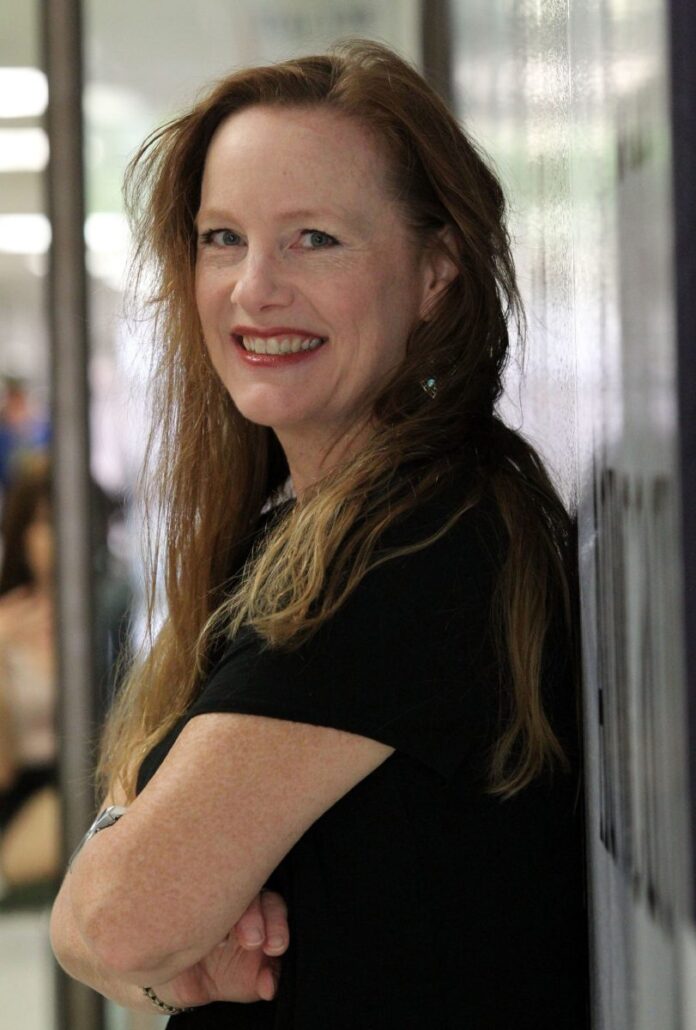EDINBURG — Cynthia Jones was the first woman to be permanently hired by the University of Texas Rio Grande Valley’s Philosophy Department, but had a college professor not intervened nearly three decades ago, she may not be where she is today.
She credits a professor in her philosophy major for recognizing that Jones was in a dating violence situation. Jones said her professor gave her the help necessary to finish that school year, and ultimately, graduate from college.
“She caught on immediately that I was in a domestic violence, dating violence situation and she said, ‘This is what we’re going to do: I will give you an incomplete in my class, and I will talk to all the other faculty,’ and she did that,” Jones said. “I was too embarrassed to tell her and she figured it all out.
“I finished school because somebody intervened and didn’t even ask any details and allowed me to get through the process.”
And it was that experience that prompted her to start UTRGV’s Office for Victim Advocacy and Violence Prevention, or OVAVP.
As OVAVP’s director, Jones acts as the same figure for students, faculty and staff at the school’s Edinburg and Brownsville campuses.
OVAVP began as a donor-funded research project in 2011 and became institutionalized when UTRGV officially opened its doors in 2015; since then, funding for the office is part of the university’s annual budget.
The office provides confidential support services to victims and survivors of sexual assault, dating and domestic violence and stalking. Its advocates explain victims’ rights and assist with finding and navigating campus and community resources such as medical assistance, mental health support, legal and law enforcement help and housing assistance. If necessary, advocates work with faculty and staff to provide student accommodations.
Confidential advocates are usually housed within a university’s counseling and health services, Jones said, and OVAVP is one of only a handful of standalone offices in the nation. It’s a model for other universities, with the University of Texas El Paso recently receiving a grant to start a similar office on its campus.
A few years after moving to the Rio Grande Valley 14 years ago, the Pennsylvania native joined the board of Mujeres Unidas (Women Together), a nonprofit that provides shelter and support services to victims of domestic violence and sexual assault.
“I realized that we had this huge gap in services (in the Rio Grande Valley),” Jones said.
She decided to start small — focusing on improving services for the UTRGV community given that one in four women will be a victim of an attempted or completed sexual assault during college.
“Most of the students aren’t harmed on campus, since it’s a commuter campus, so it makes it more of a community issue,” Jones said of OVAVP’s work.
She said more research is needed about domestic and dating violence in the Rio Grande Valley and hopes OVAVP can help spearhead that research. The office already hosts an annual advocacy conference that is open to the public and free of charge.
Last year, the office had an open file or case on approximately 160 people, and Jones’ long-term goal is for that number to increase. While she admits that might sound counterintuitive, she recognizes that many people who experience sexual assault and domestic violence do not come forward to seek services. She also hopes more men seek OVAVP services.
“(Jones) doesn’t take no for an answer, which has helped us continue with the services we provide,” said Priscilla Palacios, OVAVP’s program coordinator and Jones’ first hire. “One of the greatest things I’ve seen is how much we have been able to break down barriers here on campus and have a unique office that not many universities have.”
While Jones’ focus has shifted from working as a victim advocate to focusing on creating and improving campus policies surrounding gender-based violence, she still sees clients, sometimes a dozen a week.
“Every class I’ve taught since I started doing this work, I’ve had — sometimes during the class, sometimes a semester or two later — students come in (to OVAVP) because I tell students I’m one of the only faculty members on campus that isn’t a responsible employee,” Jones said. By this she means that if a student tells her about a sexual assault, she is not mandated to report it to administrators, who may then initiate investigations and in turn alert law enforcement. OVAVP’s advocates only report instances clients want to be reported.
“I teach one class (a semester) and I get an outcry, and odds are I have many more students in my class…” Jones said. “If one student in every class we teach came forward, imagine how many students we’d have.”
For this reason, she’s working to educate faculty and staff about OVAVP and get them involved so students don’t slip through the cracks.
“There are students who stop coming, students who withdraw from classes … because it’s hard to complete (school) if you have a domestic or dating violence situation you’re involved in,” Jones said.
“I do this work because I wouldn’t be here if it weren’t for somebody who recognized what I was going through and empowered me to finish my education.”
In observance of Women’s History Month, The Monitor is recognizing local women who inspire us. This is the seventh of eight profiles on those who made our 2018 list of “Women We Love,” a series we’ll publish every Monday and Thursday in March.




